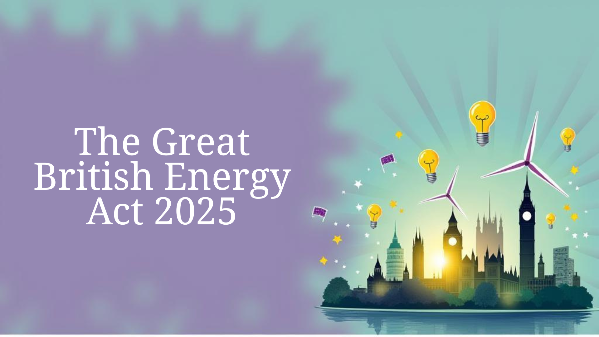Date 7th October 2025
Issue
What are the implications and challenges of The Great British Energy Act 2025, which establishes a publicly owned energy company?
Introduction
Passed by the UK Parliament in May 2025, The Great British Energy Act 2025 creates a publicly owned energy company to promote domestic clean energy projects and boost energy security. This shift has triggered political and regulatory repercussions for trade, climate commitments, and the distribution of public and private energy roles. This article explains the changes and evaluates their advantages and disadvantages in the UK and abroad. It also examines the applicability of retained EU law and comparable international cases.
Summary Of Key Developments
Great British Energy (GBE) is a state-owned corporation that was created by The Great British Energy Act 2025. It is responsible for developing, acquiring, and managing energy-generating assets. Its duties include: investing in renewable energy, preserving value for taxpayer dollars, and advancing sustainability in line with the UK's net-zero goals.
Additionally, the Act creates supervision procedures, mandates annual reporting, and authorises collaboration. It was first proposed in Labour’s 2024 manifesto, and critics have raised concerns regarding its cost, governance, and potential to disrupt market competition.
The Act is framed by broader European regulatory change, including a new EU emissions target for 2040. To shield British companies from future EU carbon border levies, the UK is exploring trade agreements. The administration must now determine how to align its new domestic legislation with the parameters of EU law.
Analysis Of Key Developments
Geographical Reach
GBE is designed to operate within a consistent legal framework throughout the United Kingdom. To balance regional knowledge with the national energy strategy, it will need to work with other devolved bodies. The UK's international commitments and export markets are impacted by the EU's trade and climate policies, as well as climate pressures in other nations.
Strengths And Weaknesses
Long-term planning is an advantage. GBE can pursue projects that support grid stability or develop technologies, such as storage or low-carbon networks, even if not immediately profitable. Public oversight may also encourage more equal investment in underserved areas.
However, there are drawbacks, including the potential for political interference, inefficiency, and capital costs. Market distortions could arise if the government compels GBE to lower consumer bills or favour specific sectors. Critics argue that uncertainty over cost recovery and accountability may discourage private investment. GBE may also struggle if it cannot match the innovation and agility of private enterprises.
Have The Issues Been Remedied?
The Act includes governance measures such as ministerial monitoring, annual reporting and legally required board structures. Amendments also include anti-slavery provisions in supply chains to guarantee ethical supply chains, for instance, the sourcing of solar panels. However, the effectiveness of these anti-politicisation safeguards will depend on their practical execution.
Examples From Other Jurisdictions
Public energy companies exist in a number of nations, including Germany's formerly state-owned utilities, Norway's Statkraft, and France's EDF, all of which was initially nationalised. Energy sovereignty often safeguards prices, environmental goals, and national security, though inefficiencies have occurred. The UK needs to take note of these models to avoid blunders.
Legislative Reach And Retained Law Implications
The Act replaces several earlier regulatory frameworks and now forms a core part of UK law. Nonetheless, under retained EU law, some energy and environmental regulations may still apply. These include emissions, grid, and environmental regulations. The government must ensure that any amendments made to retain EU law remain consistent with GBE's objectives and avoid legal conflicts.
Future Outlook
The Act is one of the most comprehensive state-led initiatives in decades, emphasising energy sovereignty and public purpose. If effective, GBE could reduce risks from emerging technologies and generate public benefit over private profit. However, the challenges remain. Operational efficiency, EU law conflicts, and political interference could limit success.
The UK must therefore uphold strong institutional safeguards, transparent procurement, and clarity in GBE’s dealings with private entities. To maintain trade competitiveness, it should also monitor global developments, particularly changes to EU climate law revisions and carbon border adjustments. Whether GBE becomes a lasting legacy of energy policy reform or a botched experiment due to complexity and overreach will be determined in the coming years.
